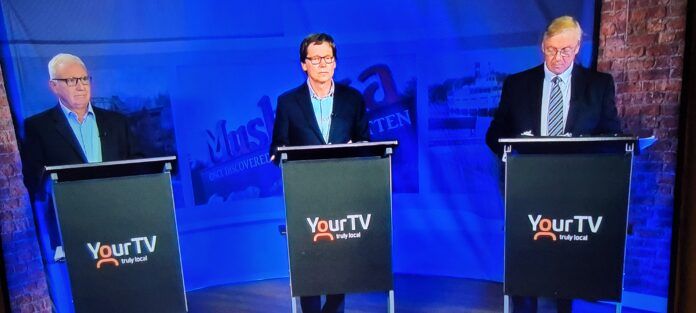With the municipal election set for Oct. 24, Sunday night was the first time Bracebridge residents got to see the three mayoral candidates square off.
James Bowler hosted Your Vote on YourTV. It featured Incumbent Mayor Rick Maloney, Michael Opara, and Paul Campbell.
In his opening remarks, Maloney cited his two decades of community involvement, including the last 12 that he’s spent on council. He was elected as a councillor in 2010 – becoming deputy mayor soon after – then was chosen as a district councillor four years ago, and was appointed mayor earlier this year. “I’ve developed important and ongoing relationships,” he said.
Opara cited his campaign slogan “save don’t pave” as what will drive him if elected mayor. “This is perhaps the most important election in the history of Bracebridge,” he said. Opara added that he wants to preserve Bracebridge and not allow it to become something like a suburb in Toronto. He said that the current council is an “old boys club” and has “ignored your concerns and voted against your interests.”
Campbell said, if elected, his priority would be to make the town more efficient. “It’s time to put our town and our lives back together,” he said. Campbell cited his multiple decades as a private businessperson in Bracebridge as what he will bring to the council table. He said that he will manage town affairs “fairly, honestly, and professionally.”
The first question was about how candidates would find a balance between necessity and financial responsibility.
Opara said the town has “super-sized debt” stemming from the Muskoka Lumber Community Centre (MLCC). He added that the town and its residents “can’t afford” what they will have to pay for the MLCC.
Maloney, in response to Opara, said the MLCC will not cause an increase to the tax levy, adding that taxation has been kept “in check” by the town over the last decade. He challenged “anyone” to show how the town has mismanaged finances, pointing out how they’ve done a “great job” dealing with the province downloading many new programs to municipalities.
Campbell said he would make sure what the town is already doing is done effectively. While it won’t lower taxes, he believes it will stabilize them. That, he says, will save the town money.
The candidates were also asked how they would make more affordable and attainable housing available.
Opara said the land surrounding Bracebridge is controlled by only a few people and what they’re building is too expensive. He added that some of the district-housing units he’s seen while campaign “look like a slum on the outside” and called it a “disgrace.”
Maloney pointed out that the recently released census data shows that Muskoka’s median income is below the provincial average. He said that Muskoka losing its status as part of Northern Ontario has hurt the municipality financially. While he said he’s continued to petition the higher levels of government to return that designation, the town needs to leverage what they like, namely Habitat for Humanity, to help build more housing.
Campbell says funding from higher levels of government has been on the table for decades. He proposed working closely with the private sector and giving them more control to build affordable units. He said the approach should be to zone for higher density, smaller units and make it easier for the private sector to produce and maintain properties.
The last question of the debate was about what the candidates would do on their first day in office.
Opara said he would hold a town hall and give residents a chance to decide how they will move forward. He said he will look after the residents and give them a voice, rather than allow staff to solely direct council.
Maloney said he would initiate the “mayor’s roundtable.” He explained he would have “frank discussions” with stakeholders regarding the challenges they face, like mental health, addictions, and those living in poverty.
Campbell said he would bring town staff together to go over how the municipality is being run, listen to their input, and outline what needs to be done over the next four years. He says the discussion would centre around how to make what the town does more cost-efficient.



